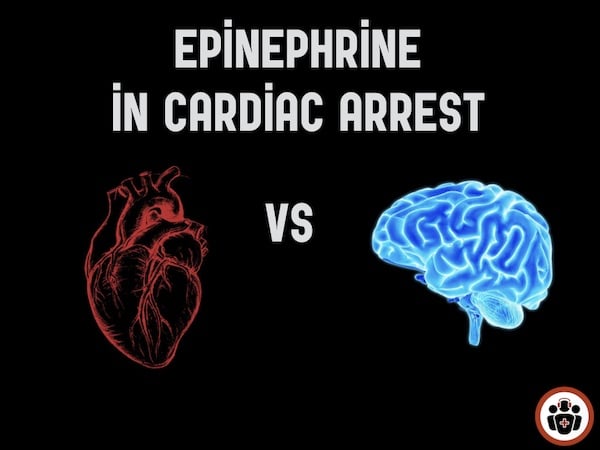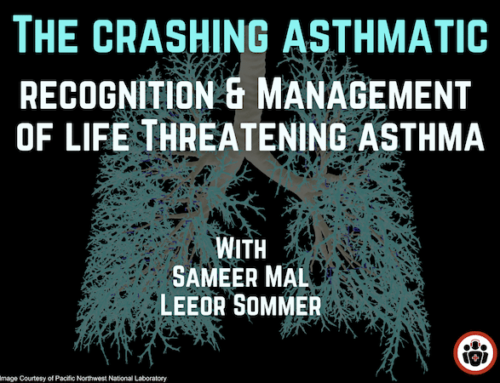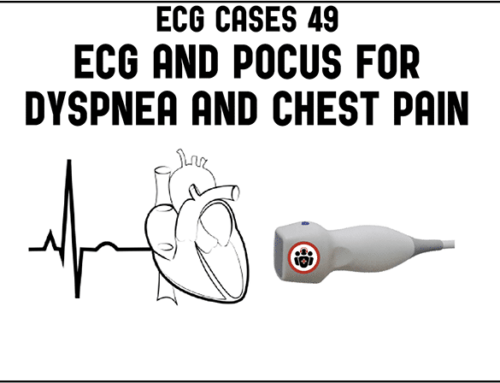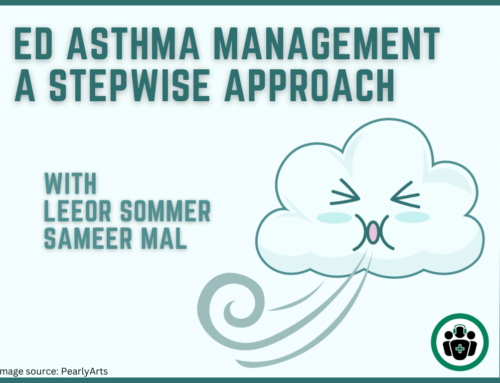Journal Jam 14 – Epinephrine in Cardiac Arrest on EM Cases
At the 2018 Resuscitation in Motion conference in Toronto I interviewed four of the world’s leading researchers in Cardiac Arrest. Among other topics I asked them their opinions on the timing, dose, specific indications and evidence for epinephrine in cardiac arrest. No surprise, there wasn’t any consensus on whether or not to use epinephrine during cardiac arrest in the first place. There wasn’t any consensus on timing or dosage either – except maybe the earlier, the better. There wasn’t any consensus on which patients are most likely to benefit from epinephrine. Some cited papers showing higher doses and earlier administration of epinephrine in cardiac arrest increasing ROSC rates, while others cited papers showing lower doses improving cerebral perfusion pressure. There was talk about titrating epinephrine in cardiac arrest to diastolic blood pressure from an arterial line, which some docs have apparently adopted in their practice. There was also talk of titrating to infrared spectroscopy cerebral oxygenation, which sounds promising, but has a whole slew of practical problems and no promising outcome data. The already famous PARAMEDIC2 trial was published after the Resuscitation in Motion conference and sparked controversy throughout the emergency medicine community. Does PARAMEDIC2 bring us any closer to answering the questions that I posed the world’s leading researchers in cardiac arrest?
The big questions is: Does epinephrine improve the chances of return of spontaneous circulation at the expense of the brain? In other words, while we know that epinephrine doubles rates of ROSC in all comers in cardiac arrest, there’s never been robust evidence for long term improvements in neurologic functional outcomes. Are we saving lives, or are we prolonging death? Find out the answer in this Journal Jam podcast with Justin Morgenstern and Rory Spiegel as we dive deep into the worlds literature on epinephrine in cardiac arrest…
Podcast production by Anton Helman, Justin Morgenstern & Rory Spiegel. Editing and sound design by Anton Helman. Blog post by Anton Helman
Cite this podcast as: Helman, A, Morgenstern, J, Spiegel, R. Epinephrine in Cardiac Arrest. Emergency Medicine Cases. November, 2018. https://emergencymedicinecases.com/epinephrine-cardiac-arrest/. Accessed [date].
References for this Journal Jam podcast on Epinephrine in Cardiac Arrest
PARAMEDIC2
Perkins GD, Ji C, Deakin CD, et al. A Randomized Trial of Epinephrine in Out-of-Hospital Cardiac Arrest. The New England journal of medicine. 2018; 379:711-721.
Stiell IG, Hebert PC, Weitzman BN, et al. High-dose epinephrine in adult cardiac arrest. The New England journal of medicine. 1992; 327(15):1045-50.
Brown CG, Martin DR, Pepe PE, et al. A comparison of standard-dose and high-dose epinephrine in cardiac arrest outside the hospital. The Multicenter High-Dose Epinephrine Study Group. The New England journal of medicine. 1992; 327(15):1051-5.
Callaham M, Madsen CD, Barton CW, Saunders CE, Pointer J. A randomized clinical trial of high-dose epinephrine and norepinephrine vs standard-dose epinephrine in prehospital cardiac arrest. JAMA. 1992; 268(19):2667-72.
Holmberg M, Holmberg S, Herlitz J. Low chance of survival among patients requiring adrenaline (epinephrine) or intubation after out-of-hospital cardiac arrest in Sweden. Resuscitation. 2002; 54(1):37-45.
Perondi MB, Reis AG, Paiva EF, Nadkarni VM, Berg RA. A comparison of high-dose and standard-dose epinephrine in children with cardiac arrest. The New England journal of medicine. 2004; 350(17):1722-30.
OPALS: Stiell IG, Wells GA, Field B. Advanced cardiac life support in out-of-hospital cardiac arrest. The New England journal of medicine. 351(7):647-56. 2004.
Ong ME, Tan EH, Ng FS, et al. Survival outcomes with the introduction of intravenous epinephrine in the management of out-of-hospital cardiac arrest. Annals of emergency medicine. 2007; 50(6):635-42.
Olasveengen TM, Sunde K, Brunborg C, Thowsen J, Steen PA, Wik L. Intravenous drug administration during out-of-hospital cardiac arrest: a randomized trial. JAMA. 2009; 302(20):2222-9.
Jacobs IG, Finn JC, Jelinek GA, Oxer HF, Thompson PL. Effect of adrenaline on survival in out-of-hospital cardiac arrest: A randomised double-blind placebo-controlled trial. Resuscitation. 2011; 82(9):1138-43.
Hagihara A, Hasegawa M, Abe T, Nagata T, Wakata Y, Miyazaki S. Prehospital epinephrine use and survival among patients with out-of-hospital cardiac arrest. JAMA. 2012; 307(11):1161-8.
Nakahara S, Tomio J, Takahashi H, et al. Evaluation of pre-hospital administration of adrenaline (epinephrine) by emergency medical services for patients with out of hospital cardiac arrest in Japan: controlled propensity matched retrospective cohort study. BMJ (Clinical research ed.). 2013; 347:f6829. PMID:
Goto Y, Maeda T, Goto Y. Effects of prehospital epinephrine during out-of-hospital cardiac arrest with initial non-shockable rhythm: an observational cohort study. Critical care. 2013; 17(5):R188.
Dumas F, Bougouin W, Geri G, et al. Is epinephrine during cardiac arrest associated with worse outcomes in resuscitated patients?Journal of the American College of Cardiology. 2014; 64(22):2360-7.
Lin S, Callaway CW, Shah PS, et al. Adrenaline for out-of-hospital cardiac arrest resuscitation: a systematic review and meta-analysis of randomized controlled trials. Resuscitation. 2014; 85(6):732-40.
Loomba RS, Nijhawan K, Aggarwal S, Arora RR. Increased return of spontaneous circulation at the expense of neurologic outcomes: Is prehospital epinephrine for out-of-hospital cardiac arrest really worth it? Journal of critical care. 2015; 30(6):1376-81.
Sagisaka R, Tanaka H, Takyu H, Ueta H, Tanaka S. Effects of repeated epinephrine administration and administer timing on witnessed out-of-hospital cardiac arrest patients. The American journal of emergency medicine. 2017; 35(10):1462-1468.
Ueta H, Tanaka H, Tanaka S, Sagisaka R, Takyu H. Quick epinephrine administration induces favorable neurological outcomes in out-of-hospital cardiac arrest patients. The American journal of emergency medicine. 2017; 35(5):676-680.
EBM Bomb…..
Drs. Helman, Morgenstern and Spiegel have no conflicts of interest to declare
Other FOAMed Resources on Epinephrine in Cardiac Arrest
First10EM on Epinephrine in out of hospital cardiac arrest: a review of all the evidence
REBEL EM on Beyond ACLS: Is It Time to Abandon Epinephrine in Out-Of-Hospital Cardiac Arrest?
The NNT on Epinephrine for Out-of-Hospital Cardiac Arrest
EMCrit Wee on Abandon Epinephrine?
The EMJClub Emergency Medicine Podcast on Epinephrine in Out-of-Hospital Cardiac Arrest





I thought this was a fantastic discussion. Thank you.
Here are my questions:
1. Is it relevant to “think of the family?” Is it better for the family to have some time to say goodbye to their loved one in ICU because the patient had ROSC with epi, or is it easier on the family to tell them that the patient was pronounced at the scene without being given epi? Should this “family variable” even enter into this discussion?
2. Is having ROSC at the scene and brain death determined at a later date, does this influence organ donor possibilities?
Thank you again.